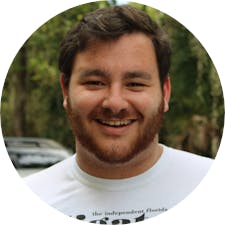In 2015, the U.S. senator who’s likely to become UF’s next president called the Supreme Court’s decision to federally protect the right to same-sex marriage “a disappointment.”
Seven years later, many UF students now share a similar sentiment about the UF presidential search committee’s unanimous choice to make him the lone finalist for the university’s presidency.
The committee announced its recommendation of Sen. Ben Sasse, R-Nebraska, Oct. 6 to the outrage of many in the UF community. As members of the university community gear up for his first campus appearance as finalist Oct. 10, some worry his potential appointment could foreshadow a bleak future for UF’s inclusivity toward LGBTQ students and faculty.
Sasse’s statement about Obergefell v. Hodges affirms his stance, which is that marriage should be between a man and a woman. His website still lists “the sanctity of marriage” as a top issue.
RJ Della Salle, an 18-year-old UF political science freshman who identifies as gay, said Sasse’s comments on Obergefell are troubling. If Sasse were president during his college application process, he would’ve thought twice about attending UF.
Salle, who lives in the Lavender Living Learning Community for LGBTQ students at Springs Residential Complex, said he plans on attending a protest scheduled Oct. 10 outside of Emerson Alumni Hall where Sasse will speak to faculty, staff and students in three forums.
“We either have someone who’s a genuine homophobe as our president or we have a sleazy politician who just says what the people that he’s trying to get elected by want to hear,” he said.
Prior to spending seven years in Congress, Sasse, 50, was the president of Midland University — a Lutheran college of about more than 1,600 students. He left the school in 2014 after launching a successful bid for U.S. Senate, also earning reelection in 2020.
Rahul Patel, a UF trustee and the chair of the presidential search committee, has continually denied Sasse’s politics factored into UF’s decision. More important than being a politician, Sasse’s an academic, Patel said, who has no intention of imposing his political beliefs onto the student body.
But Sasse’s voting record puts his ideology in clear focus: Sasse earned a 0/100 rating from the Human Rights Campaign, an LGBTQ advocacy group, based on his actions in Congress.
He also dismissed the need for a Respect For Marriage Act — proposed legislation that would make the federal government recognize same-sex and interracial marriages. The bill was just a “bullsh-t” attempt by Speaker of the House Nancy Pelosi “to divide America with culture wars,” Sasse told reporters in July.
“Like every senator, Ben’s job was to vote yes or no on legislation on behalf of his state,” Patel told the Alligator Oct. 6. “He did that job. But that’s not this job. He is putting aside politics and coming back to academia to lead us through this exciting new era.”
Enjoy what you’re reading? Get content from The Alligator delivered to your inbox
In a 2018 New Yorker column, Osita Nwanevu noted Sasse often fails to acknowledge that his ideas on same-sex marriage could be contradictory to his mission of facilitating strong families.
Sasse’s congressional office didn’t respond to requests for comment before publication.
For those aware of UF’s well-documented history of systemic homophobia, Sasse’s comments are a call back to a time when being LGBTQ on campus put a target on some community members’ backs.
The Johns Committee, which was formed by the Florida Legislature to investigate Communist connections to civil rights movements, was an effort supported by then-President Julius Wayne Reitz. Between 1956 to 1965, UF orchestrated targeted attacks on LGBTQ members of the university community, forcing about 15 professors and 50 students to leave campus.
Though not as overt as it once was, similar rhetoric lingers for some like Alex Noon, a 23-year-old second-year UF law student and president of the law school’s LGBTQ organization OUTLaw.
He recalled one instance at a Moot Court tryout where he was nearly forced to argue in favor of
conversion therapy — a topic suggested by students and later approved by faculty.
Also, until he and other queer students protested, the law school also mandated a Zoom meeting with Mathew Staver, whose Liberty Counsel firm is proudly homophobic and labeled a hate group by the Southern Poverty Law Center.
The university’s choice to make Sasse a finalist was disappointing, Noon said, but not surprising. Still, he can’t help but feel queer students are at the bottom of UF’s priority list, he said.
To queer students, Sasse represents a blatant disregard for their livelihoods, Noon said.
“It blows my mind that this is the sole person that they came up with,” Noon said. “I could probably go downtown on a Thursday and find someone better.”
Another law student — Jenna Cliatt, a 24-year-old third-year who identifies as queer — said Sasse’s comments on Obergefell show a clear disrespect for the rule of law.
Cliatt worries about the trickle-down effect of having someone who’s anti-LGBTQ could have on the campus atmosphere, she said. Lesser known resources like the LGBTQ presidential advisory committee, Cliatt said, may quietly begin to disappear.
“I think that it’s only going to get worse and be a more unwelcoming climate, which is very troubling given UF is increasing in rankings and trying to attract a diverse student body,” she said.
When UF broke the news Oct. 6, comment sections across all social media platforms lit up with outrage.
Kenya Warner, a 20-year-old UF computer science junior who identifies as lesbian, said it appears obvious the search committee expected backlash. Sasse’s the most polarizing person UF could have come up with, she said.
It’s disheartening to see a politician — let alone one who fundamentally disagrees with her existence — become a thought leader on campus, Warner said.
“The pendulum shouldn’t swing either way,” Warner said. “You shouldn’t be super far left or super far right.”
Warner will be at Sasse’s public forum for students Oct. 10 — though she said she doesn’t expect much substance from the pre-approved questions UF will let him answer. But Warner hopes Sasse gets to address his homophobic past as protestors pool outside Emerson Alumni Hall.
Kestrel Ward, a 37-year-old UF visiting education librarian who identifies as queer and nonbinary, agrees the forums won’t amount to much — whether they decide to participate in the forum inside and listen to filtered questions or join in protest depends on their mood, Ward said.
Even though Sasse’s anti-LGBTQ stance could make faculty and staff more wary of being openly queer at work, Ward said they find solace in how many people have been outspoken against him.
There’s nothing Sasse could say that would make Ward less skeptical of UF’s choice. Sasse’s actions as president will be more telling, they said.
“I don’t care what he says; I care what he does,” Ward said. “And what he has done so far has been detrimental to my community.”
Christian Casale contributed to this report.
Contact Alan at ahalaly@alligator.org. Follow him on Twitter @AlanHalaly.
The Independent Florida Alligator has been independent of the university since 1971, your donation today could help #SaveStudentNewsrooms. Please consider giving today.

Alan Halaly is a third-year journalism major and the Engagement Managing Editor of The Alligator. He’s previously served as Metro Editor and Photo Editor. Alan has also held internships with the Miami New Times and The Daily Beast, and spent his first two semesters in college on The Alligator’s Metro desk covering city and county affairs.







